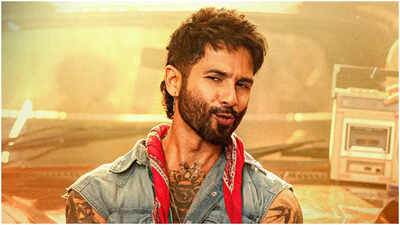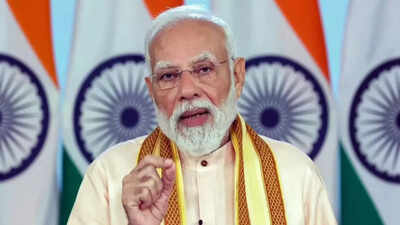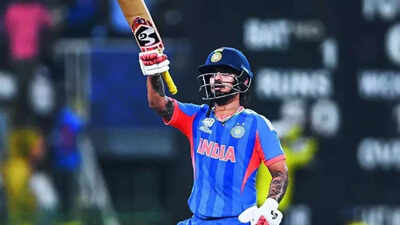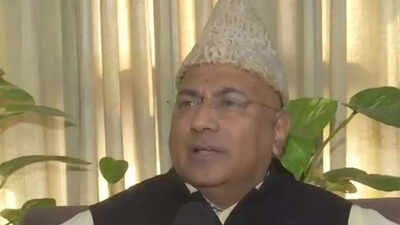Gyttja, Caziques, Mbaqanga Scrabble’s now a competitive sport | India News
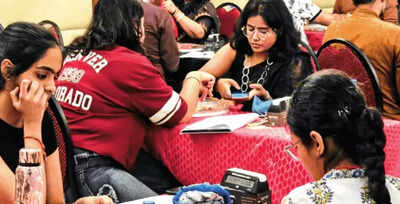
It was once a gentle, afternoon pastime. But, for an increasing number of players, making up words on a board is a serious pursuit — for which they crisscross the country and even go abroad, writes Avijit GhoshIn a chandelier-lit basement of a south Delhi hotel, a bunch of men and women across 30 tables are focused on a board game that seems gender-neutral and age-agnostic. A 10-year-old fourth-grader squares off with a 60+ English professor, and a retired civil servant duels with a young businesswoman. The players take notes, challenge words and, much like chess, press a game timer.But it’s the frequent clatter, much akin to a rattlesnake clicking its tail, that gives the roomy arena its buzz and the game its signature. It’s the sound of the tile bag being jiggled and shaken; that is where consonants and vowels are stored, and from which match-winning words are formed. Welcome to the serious world of competitive Scrabble — once a gentle afternoon pastime, it is now a sharp strategic sport that receives little media attention.Early last month, though, the scenario changed, albeit briefly, when Madhav Gopal Kamath, a class 10 student from Delhi (see box), became the first Indian to win the 2025 World Youth Scrabble Championship. “People were astonished to know Madhav was just 14 years old,” says Harry Bhatia, president, Scrabble Association of India (SAI).Scrabble was invented by unemployed American architect Alfred Mosher Butts during the Great Depression, which haunted the US in the 1930s. While the exact year it arrived in India is fuzzy, senior citizens from English-aware homes recall relishing the game or its variants in childhood.“What we do know is that it emerged as a competitive sport in the mid-1990s in Hyderabad,” says Mohan Chunkath, 69, India’s first national champion. Since then, the sport has gained ground. Scrabble clubs are active in Bengaluru, Delhi, Mumbai, Chennai, Goa, Hyderabad, Pune, Vadodara, Kochi, with Kottayam the latest addition. From around 60-odd players in the 1990s, India has about 400 registered players now, says Bhatia. Players are ranked and rated on performance. The Chennai-based Chunkath says he was the lone player to represent India at the Melbourne world championship in 1999. That number now has gone up to six-eight.There are more young players on the scene. Vihaan Singhvi, a class 10 student from Jaipur who was part of India’s youth team, learnt the sport from his aunt. “Jaipur doesn’t have too many offline players. I mainly play online,” he says. His sister, Khanak, just 6, is a promising Scrabbler. So is Noida-based Dahlia Verma, 12, who has represented her school at an international inter-school meet.Nine-time national champion Sherwin Rodrigues says domestic tournaments have doubled since he started competing in 2005. “Currently, we have about 10-12 three-day tourneys,” he says, “plus a clutch of one-dayers, making it a packed domestic calendar.”A team-based Scrabble League is also scheduled in Lonavla next month. The KSSA Indian Open, a four-day international meet, will be held in Bengaluru next Jan. Corporates, too, are slowly coming on board, pun intended. “Kids are even putting Scrabble in their college resumes,” says Bhatia. “We are forming more state associations to boost the game’s infrastructure,” he adds.What’s Gyttja?Scrabble is a complex mix of word knowledge, strategy, concentration and chance. Words are loved not for their beauty, but for the points they rack up. India’s top-ranked woman player, Ishika Shivalingaiah, used “roneoed”, in Delhi last week. The word is ‘playable’ and means ‘duplicated’.In the past too, she has used words that would stump most of us. “Gyttja”, for one, which means a fine-grained, high-organic-matter sediment, or, just, “Shh” — to silence someone. The validity of a word can be ‘challenged’. But Scrabble has its own DRS, the all-knowing umpire: the Collins Scrabble Word List, a constantly growing dictionary.Ishika and other Scrabblers also point out that the game is about much more than just employing high-scoring ‘playable’ words to create a “bingo”, the term for any seven-letter word that fetches an extra 50 points. Which is why, as Chunkath points out, the best players are not literature professors, but mathematicians, computer programmers and musicians. “They follow patterns,” he says.Good players practice one-two hours daily. “They must be good at tile-tracking, which means being aware of the letters already played and those yet to come,” says Vihaan. Rack management, balancing vowels and consonants, is another key skill, he says.Nonetheless, an element of randomness is integral to Scrabble. “You have no control over the tile (letter) fished out of the bag,” says Chunkath. But there’s a general consensus that while luck can be critical in a single match, it mostly evens out in tournaments, where every player plays about 25 matches. Attentiveness, too, is vital when you are playing eight games per day, each lasting 50-60 minutes.Simply put, a combination of word knowledge, strategy and attentiveness outdoes the role of chance. “Nigel Richards of New Zealand, the current world champion, is the best because his strategy is unmatched,” Madhav says.Like chess, volleyball and basketball, defence, too, is integral to Scrabble. You play in a way to maximise your own points, but you also block your opponent from piling them up. Madhav recalls being tested in Malaysia against Nigeria’s Abdulqudus Aliu Olawale, who had bested him on previous occasions.“My style is open and high-scoring; He is defence-oriented, a master in limiting the opponent’s scoring opportunity,” Madhav explains. “I had to adapt by becoming a blocker myself.” It was a tight encounter, but Abdulqudus ran into time trouble and Madhav prevailed.Anjana Meira Dev, 61, who teaches English in Delhi’s Gargi College, says Gen Z players are sharper strategists and memorise more. “They can make words they don’t know the meaning of. Which is legal. But we never did that. They also anticipate bingos better,” she says. “They play Scrabble like T20. For us, it is Test cricket,” says Anjana, who started playing when she was six.These days, players also use technology to improve their game. Ishika uses a web app, ‘aerolith’, which offers a fast way to learn words and woogles.io, a free, non-profit online platform for word gamers, which also analyses matches, including the best possible choices you could have made. Madhav refers to a word tool, zyzzyva.‘Works Like An Antidepressant’Players have taken to Scrabble for different reasons and ended up being its devotees. Ishika, a 43-year-old consultant at PWC, was a former chess player who had sparred against the likes of Tania Sachdev and Harika Dronavalli. She got interested in the word game after participating in a corporate event five years ago. What chess couldn’t give her, Scrabble did: major success.For hotelier Ritu Chadha, the game has been like meditation, her ‘no-mobile time’. “It works like an antidepressant for me,” says Ritu, also treasurer, SAI.Many Scrabblers, like her, are working professionals. Money is invested in, rather than taken out of the game. Prize money is low, sponsors rare, plane tickets and hotel bills footed individually. “Every time, I tell myself I am not doing this anymore. But I end up doing it again,” says Ritu. Then she smiles and says, “I guess I am addicted.” Most tournaments last three days. “Expenses roughly work out to Rs 25,000 for each of them,” says Rodrigues, who plays about five of them every year. The India No.2 won the Delhi Scrabble Open last week and pocketed Rs 20,000. The cost-benefit ratio doesn’t add up.Yet Scrabble thrives, not on prize money, but passion. And, one carefully placed letter at a time.Did You Know?Oxyphenbutazone is potentially the highest scoring word in Scrabble. It can net up to 1,778 pointsAkshay Bhandarkar, currently India’s top-ranked player, won the World English-language Scrabble Players Association (WESPA) title in 2017. He had represented Bahrain then
Bingo! India has a youth world champion
Madhav Gopal Kamath’s first memory of Scrabble is watching a game and pointing out how the player had missed out on the word, ‘aediles’, the plural for magistrates in ancient Rome. He had seen his father use the word a fortnight before that and remembered. He was five.The boy could remember well even before he had properly begun to read. When four, he learned the names of 80 dinosaurs from flashcards. “From a very young age, he could concentrate well. We knew he was gifted,” says his entrepreneur father, Sudhir.By the time he was eight, Madhav would occasionally beat Sudhir. “But in the last two years, it has been eight out of 10,” he says. Sudhir is ranked 28 in Scrabble Association of India’s latest official ratings. Madhav is India No.3 — and No.1 among juniors.
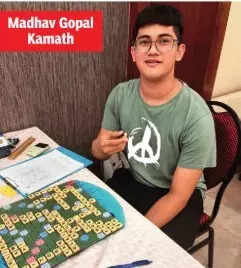
,
The Class 10 student of Delhi’s Sanskriti School has bigger plaudits to his name, though. When he became the world youth champion in Malaysia last month, he also pocketed a cash prize of $1,000. He is also the national champion. His ambition is to be world champ. “But I have a long way to go,” he says.“What makes Madhav special is his ability to stay cool under pressure, which is crucial during end games,” says Neeta Bhatia, who was coach and team manager at the Malaysia event.In the Scrabble Association of India (SAI) magazine, Endgame, Madhav spelt out a small list of dream playable words back in Sept 2021. Two of them were: “Caziques” and “Mbaqanga”. Do you know what they mean?

